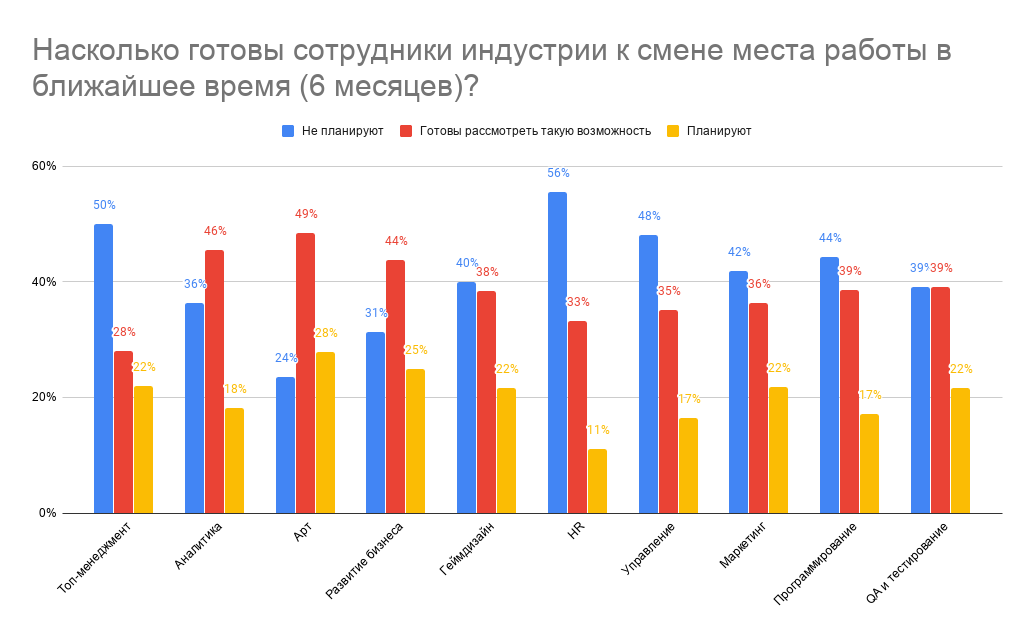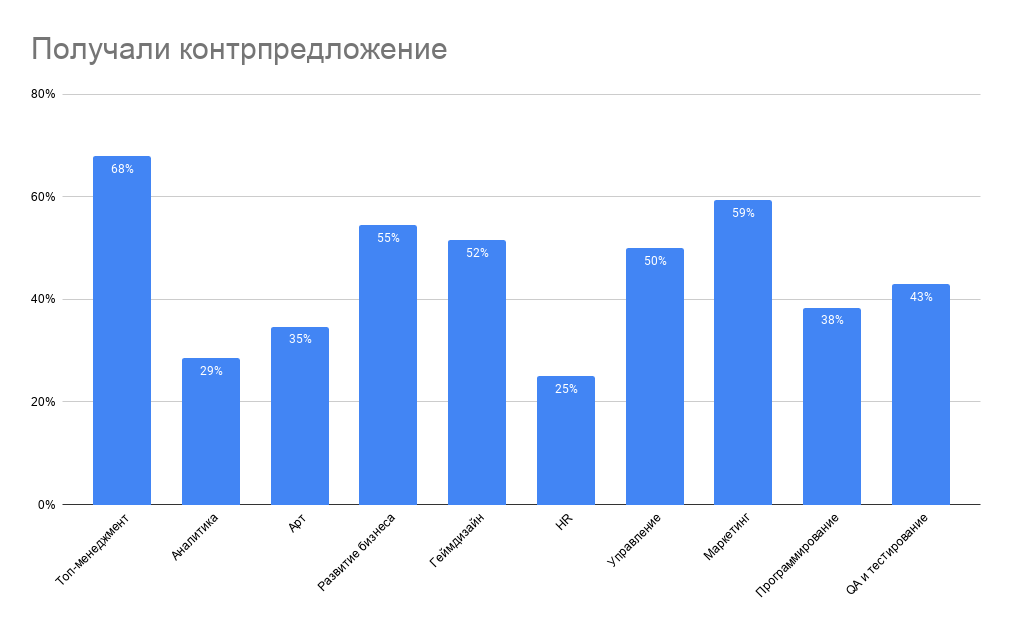How often do people move to a new job in the gaming industry, what factors influence this, how widespread is “hunting” — these and many other questions are answered by the results of a study that we jointly conducted App2Top.ru and a job search service TalentsInGames.com .
Methodology
In December on the pages App2Top.ru a survey was conducted. In it, readers of the site associated with the gaming industry were asked to answer a number of questions. In January, we grouped the data obtained, and we offer you to get acquainted with them.
Research audience
In total, 1106 people took part in the survey, including:
- 75.6% are men;
- 73.7% — people aged 25 to 34 years;
- 40% have been working in the industry for more than 6 years;
- 67.8% — residents of Russia, 12.4% — Ukraine, another 11.1% — Belarus.
Important: at the beginning of the survey, each respondent was asked what area of game development he was engaged in. Among the options were both common areas (game design, art) and less common (legal issues, system administration). The study has charts in which the data is broken down by specialty. Some of the professions are not specified in them. The fact is that few samples (ten or fewer people) we considered them unrepresentative. However, in the general diagrams (without a breakdown by specialty), these data, of course, were taken into account.
How often do they change jobs?
Most of the respondents (30.4%) change jobs every two years, but the percentage of those who do it much less often is high: 23.6% of respondents change their jobs every five years. Slightly less than one fifth of employees (16.6%) have never changed jobs in their lives.
The frequency of job changes depends on two factors.
Firstly, it depends on the specialty/position of the person in the company. For example, among top managers there is a more numerous group of those who change jobs every five years – 32%, and among analysts 50% change jobs every two years.
The second obvious factor affecting distribution is how long an employee has been employed in the industry. The longer a person is employed in the field, the less often he changes his place.
For what reason do they usually change jobs?
The most popular reason for changing jobs is that an employee ceases to feel that he is growing as a professional (important: here respondents could choose several answers). This was stated by 21.2% of respondents. Also, the three most popular reasons included: dissatisfaction with salary (17.7%) and lack of career growth (17.6%). Relevant for the Western processing industry, by the way, one of the least pressing problems. It was noted by only 4.4% of respondents.
A mirror situation with game designers. For them, the most pressing problem is the lack of professional growth, but in second place in relevance is the problem with career growth, not money.
The main reason why artists change jobs is dissatisfaction with wages (17.9%). In second place — dissatisfaction with the company’s culture (problems with the level of trust, teamwork is not built, there is no opportunity to share ideas) and lack of professional growth (16.4%).
Like artists, programmers most often change jobs because they are dissatisfied with wages. Another important reason for them is the lack of professional growth.
In general, this ratio is true for both top managers and management in general.
Hunting cannot be called a popular reason for the transition. As a rule, specialists leave primarily because they feel that they are not developing (this problem is especially relevant for simple management, among them 25.9% of respondents noted that they leave the workplace because they do not grow as professionals).
But this does not mean that hunting as a phenomenon is absent.
How actively are they hunted in the industry?
75.9% of respondents noted that they were tried to be lured to another company. Of those who were tried to be hired, 65.9% refused to transfer to another company.
The most common is the hunting of top managers, business development specialists and HR-s. In general, those who are in sight.
How ready are industry employees to change jobs?
40.7% of respondents said that they do not plan to leave their current place in the near future. The same number also stated that they do not exclude such a possibility if circumstances develop in a certain way. Only 20.7% of respondents noted that they plan to change jobs in the next six months.
Whether an employee was tried to poach or not, as well as whether he agreed to the offer, does not significantly affect the distribution. Also, it does not affect how long a person has been working in the company, but at the same time, the specialty is of great importance.
For example, HR-s are the most loyal to companies, but artists in half of the cases are ready to consider moving to another company. Perhaps this graph should be considered as a conditional index of professional satisfaction with their position in the industry.
From the obvious: in the areas where the percentage of those who are ready to leave the company is the highest, the percentage of those considering such an opportunity is also the highest. The opposite is also true: in those specialties where most of the respondents do not plan to leave work, as a rule, the smallest percentage of those who are ready to consider the option to leave the company.
What keeps employees in the company
Most of the respondents (24.9%) say that they are ready to stay in the company if their salary is raised. For many (17.7%), it is also important if they are allowed to work on products that are significant for the company.
Although most specialists note that they lack professional growth, only 15.2% of respondents said that they are ready to stay in the company if they are given new training opportunities.
In the context of each specialty, the situation is duplicated. Designers, artists, and programmers answer the same way: they are ready to stay for a bigger salary.
The only slight difference from the overall picture is shown by top managers. The answers “I am ready to stay in case of a salary increase” and “I am ready to stay if I am involved in projects that are significant for the company” are almost equal in popularity. The difference between them is 1.5%. Plus, the non-standard answer “I’m ready to stay if I get support from management in solving problems” turned out to be popular among them.
How common is the experience of receiving a counteroffer?
Getting a counteroffer from an employer in case of leaving is a common practice: 46.9% of respondents have encountered this. However, the situation very much depends on the specialization within which the employee works. Top managers are much more likely to receive counter-offers than HR or QA specialists.
In 80% of cases, those who received counter-offers were offered money. Only 2% — a share in the company. In other cases — development proposals.
In 60% of cases, those who received counter—offers remained (in 65% of cases — when they guaranteed an improvement in financial conditions, and in 75% – when they offered a share in the company).
***
Results:
- 70% of specialists change jobs no more than twice a year;
- the main reason for changing jobs is the lack of professional growth;
- most employees face hunting, but, as a rule, they do not transfer, but remain in their companies;
- only 20% of respondents speak with confidence about changing their place in the near future;
- at the same time, an increase in wages can keep most of them.











